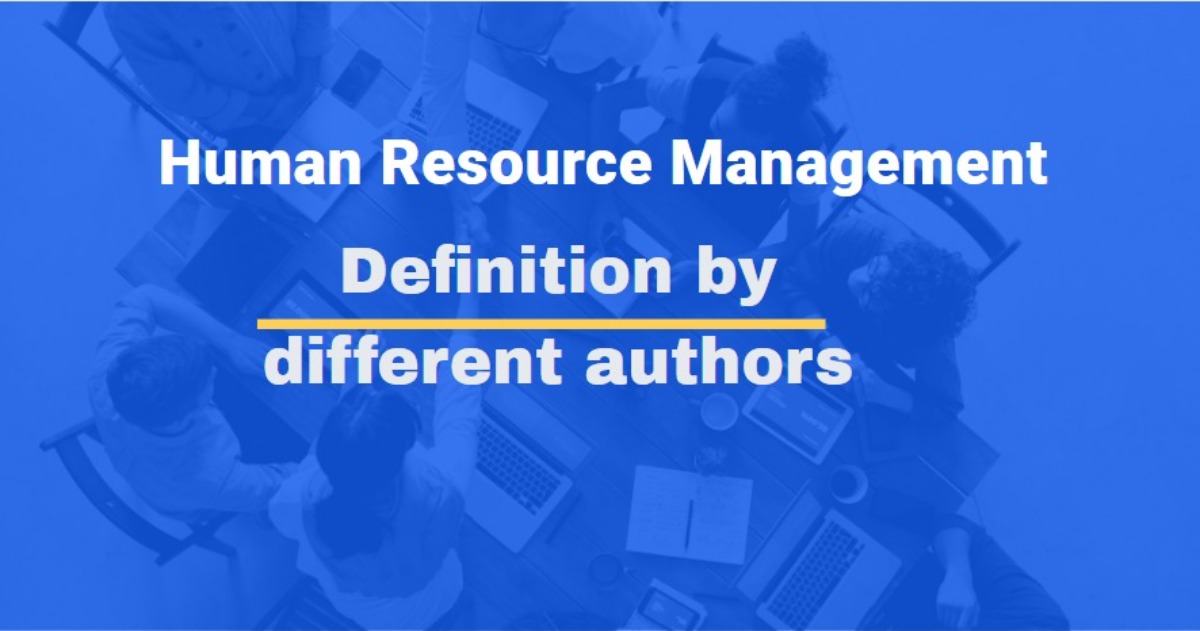Human Resource Management Definition by different authors:
According to Flippo, HRM is “planning, organizing, directing and controlling of the procurement, development, compensation, integration, maintenance, and separation of human resources to the end that individual, organizational and societal objectives are accomplished”.
Robbins and Decenzo define ” HRM is a process of acquiring, retaining, developing, terminating and properly using the human resources in an organization”.
Dessler defines “HRM as a process of acquiring, training, appraising, and compensating employees, and attending to their labor relations, health and safety, and fairness concerns”.
Mathis and Jackson define “HRM deals with the design of formal systems in an organization to ensure the effective and efficient use of human talents to accomplish organizational goals”.
John Storey, states that “HRM is a distinctive approach to employment management which seeks to achieve competitive advantage through the strategic deployment of a highly committed and capable workforce, using an integrated array of cultural, structural and personal techniques”.
Human Resource Management definition by Pigors and Myers “It is basically a method of developing potentialities of employees so that they feel maximum satisfaction of their work and give their best efforts to the organization”.
HRM Definition by M. J. Jucious: “The field of HRM involves planning, organization, directing and controlling functions of procuring, developing, maintaining and utilizing a labor force.”
HRM Definition by Ricky W. Griffin: “Human Resource Management is the set of organizational activities directed at attracting, developing and maintaining an effective workforce.”
Human Resource Management definition by Dale Yoder: “HRM is the provision of leadership and direction of people in their working or employment relationship.”
HRM definition by Milkovich & Boudreau: “Human Resource Management is a series of decisions that affect the relationship between employee and employer: it affects many constituencies and is intended to influences the effectiveness of employee and employer.
Definition by Graham
” The purpose of HRM is to ensure that the employees of an organization are used in such a way that the employer obtains the greatest possible benefit from their abilities and the employees obtain both material and psychological rewards from their work”
HRM definition by Buchanan and Huczynski ” HRM is a managerial perspective which argues the need to establish an integrated series of personnel policies to support organizational strategy”.
From the above definition, we can assume that HRM is the practice of recruiting, hiring, deploying, and managing an organization’s employees. Human resource management uses the available skilled staff and also makes efficient use of existing staff in the organization by managing them properly.
All the activities of HRM are as follows:
- Human resources planning
- Job analysis and design
- Recruitment and selection of employee
- Employee Placement
- Orientation and induction
- Training and development
- Performance appraisal
- Job Evaluation
- Compensation planning and remuneration
- Motivation, welfare, health, and safety
- Industrial relation
- Green HRM
Some Questions on HRM:
- “Employee is the key to productivity” justify your answer.
- Why is managing employee at work so complex?
- Define Human Resources Management. How does HRM affect all managers?
- How would you maximize competitive advantage through people?
- An HR manager must be effective and efficient. Why?

Leave a Reply